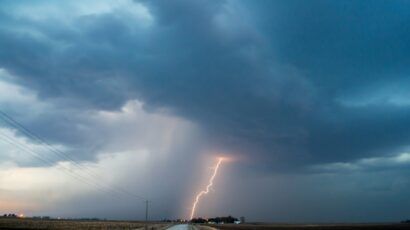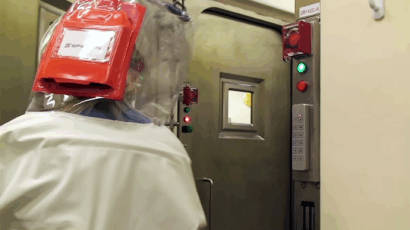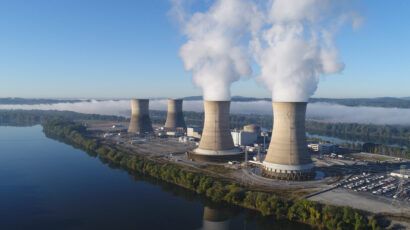The enormous risks and uncertain benefits of an Israeli strike against Iran’s nuclear facilities
By Assaf Zoran | April 18, 2024
 Israel used its Iron Dome and Arrow 3 (shown here during a test in 2022) defense systems to intercept the more than 300 missiles and drones that Iran launched at Israel on April 13. Israel said it plans to respond to Iran's attack. (Credit: Israel Defense Ministry, via Wikimedia Commons)
Israel used its Iron Dome and Arrow 3 (shown here during a test in 2022) defense systems to intercept the more than 300 missiles and drones that Iran launched at Israel on April 13. Israel said it plans to respond to Iran's attack. (Credit: Israel Defense Ministry, via Wikimedia Commons)
Iran’s unprecedented attack on Israel on April 13 has significantly escalated the tensions between the countries. For the first time, a declared and extensive Iranian military operation was carried out on Israeli territory. Now, the decision on how to respond rests with Israel. A direct war between the two countries now no longer seems unlikely.
Israel now realizes that it underestimated the consequences of its attack on an Iranian facility in Damascus that killed several senior members of Iran’s Islamic Revolutionary Guard Corps earlier this month. However, the exceptionally large scope of Iran’s response and the direct impact on Israeli soil is viewed in Israel as a disproportionate action that significantly escalates the conflict.
Despite the interception of most of the weapons launched by Iran and the lack of significant damage on Israeli territory, the outcome of the Iranian attack could have been vastly different due to the uncertainties of combat. Consequently, in Israel, there is a strong focus on Iran’s intentions and Tehran’s willingness to risk a direct confrontation.
Since Israel does not want to depend solely on defense and aims to prevent the normalization of attacks on its territory, it appears resolute to respond, reinforce its deterrence, and inflict a significant cost that will make Iran’s decision-makers think twice before attacking similarly again.
While some in Israel advocate for a robust immediate response to project power and display independence despite international pressures, others prefer a more cautious and measured reaction to limit the risk of escalating into a major regional war.
Several main response options are under consideration, possibly in combination: a diplomatic move, such as forming a regional defensive coalition against Iran and its armed allies in the “axis of resistance,” or revitalizing international efforts against Iran’s nuclear program; a covert kinetic operation, like past operations attributed to Israel targeting nuclear or missile facilities; or an overt kinetic military initiative, such as a missile or aircraft strike on Iranian territory.
Both covert and overt kinetic actions can vary in intensity and target different sectors—military, governmental, or nuclear.
Currently, there is significant attention on the potential for Israel to execute a kinetic move against Iranian nuclear sites, covertly or overtly. Iran itself recently closed these facilities due to security concerns—a move noted by the international community, including the Director General of the International Atomic Energy Agency, Rafael Grossi, who stated that inspectors have been temporarily withdrawn.
Within Israel, some perceive the current situation as an opportunity to impair Iran’s nuclear program, considered a primary national security threat. The possibility of a military strike is reportedly under examination. In contrast, Meir Ben-Shabbat, former head of the National Security Council, suggested that Israel should target the Iranian nuclear program through diplomatic avenues.
The ability to execute an extensive and effective kinetic operation against Iran’s nuclear facilities on a short notice is doubtful. Such a move is also likely to lead to upheaval in the Middle East, contrary to Israeli officials’ statements that a military response will not lead to a full-scale war with Iran.
Conversely, a precise strike on nuclear facilities in Isfahan, Natanz, Araq, or Fordow could not only rekindle international attention toward Iran’s nuclear aspirations, it would also affirm Israel’s commitment to act after several years without significant action in that regard. In doing so, Israel could demonstrate resolve, conveying clearly that it does not accept the nuclear precedent Iran has established in recent years and is willing to take decisive action if necessary, even if opposed or not supported by the international community.
Moreover, a successful attack on a heavily protected target would highlight Israel’s superior capabilities and would undermine the new game rules that Iran attempted to establish. This, in turn, could decrease the likelihood of future attacks on Israeli territory.
Regionally, attacking a nuclear site could bolster Israel’s image as the sole nation daring enough to confront Iran and counter its provocations, particularly following the security breach on October 7. This action could effectively demonstrate Israel’s determination, showcase its military edge.
However, an attack on Iran’s nuclear facilities carries significant drawbacks.
In the short term, it would considerably increase the likelihood of a retaliatory response from Tehran, potentially even more severe, targeting sensitive locations in Israeli territory, and possibly extending to American and Jordanian interests in the region. This could inhibit the possibility of employing measured escalation levels and quickly lead to a broader conflict.
Hezbollah, which Iran sees as one of its assurances in case of an attack on its nuclear facilities, might be compelled to intensify its assaults against Israel.
Moreover, an attack on Iran’s nuclear facilities may have the opposite result of prompting an escalation in Iran’s nuclear developments, a pattern previously observed in response to kinetic actions attributed to Israel. Such an attack could be used by Tehran as a justification and motivation to progress toward nuclear weapons development, confirming that conventional deterrence is insufficient. In recent years—and in past months even more so—senior Iranian figures have increasingly hinted at this possibility.
An overt attack on Iran could also diminish Israel’s legitimacy and international support, which momentarily recovered amid a historic low following the war in Gaza. This erosion could jeopardize diplomatic efforts to establish renewed coalitions and strategies against Iran.
Although it is crucial for Israel to impose a significant cost on Iran in response to its April 13 attack to deter further aggressive actions in the region, targeting nuclear facilities might be strategically disadvantageous. The costs could heavily outweigh the benefits, and Israel should be prudent to focus on a proportionate response, such as targeting missile and drone infrastructures in Iran or other Iranian assets in the region.
At the same time, it is vital to invest in a substantial political response, such as forming a defensive coalition against the resistance axis and incorporating into it countries threatened by Iran under international auspices. Amid an emerging contest of superpowers in the region and beyond, such a political response also presents an opportunity to foster closer ties and strengthen commitments between these nations and the West.
Together, we make the world safer.
The Bulletin elevates expert voices above the noise. But as an independent nonprofit organization, our operations depend on the support of readers like you. Help us continue to deliver quality journalism that holds leaders accountable. Your support of our work at any level is important. In return, we promise our coverage will be understandable, influential, vigilant, solution-oriented, and fair-minded. Together we can make a difference.
Keywords: Gaza, Iran, Iranian nuclear program, Israel, Israel-Iran relations
Topics: Nuclear Weapons, Opinion
















In the 2nd paragraph of your article , you refer to the Iranian “facility” in Damascus on 1/4/24 . More accurately , that was a diplomatic premises – the destruction of which / people therein breaches of the UN Charter, the 1961 Vienna Convention on Diplomatic Relations and the 1963 Vienna Convention on Consular Relations. At the meeting of the UN Security Council the next day, the United States representative stated that the US ” does not have confirmation of the status of the building that was struck in Damascus”. Being as gentle as possible, you published this article on… Read more »
When a criminal state like Iran is in play, diplomatic rules should not apply, the whole world should ban the Iranian government from any diplomatic rights since is a criminal state.
Just because Hezbollah says the facility in question is a “diplomatic” premises does not mean it actually is one (even the US government said today (April 18th) that they are STILL investigating this facility to see if it was in fact a diplomatic premises or not (so certainly it cannot be said that “ the true status of the building cannot be in any doubt” if the US is still investigating to see if it was in fact a diplomatic premises even today) It is also important to note that the only building which without any doubt is a diplomatic… Read more »
With this logic any diplomatic building looses its sanctity as adversary can say that military personnel were present. The same logic being applied B r u t a lly in Gaza for bombing children hospital facilities.